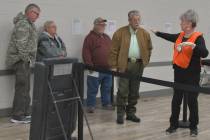FROM THE EDITOR:Militarized police an existential threat to liberty
The Wall Street Journal published an essay by author Radley Balko last week that caught my attention and I thought I’d share some of it here.
Balko is the author of “Rise of the Warrior Cop,” a 332-page book published this month by PublicAffairs.
His WSJ essay is titled “Rise of the Warrior Cop: Is it time to reconsider the militarization of American policing?”
I’ll print the link to the online version at the end for those of you interested in reading the piece.
The essay caught my eye because the subject matter has gotten quite a bit of attention over the last year or so. Also, because of the terrifying events earlier this year in Boston, it struck me as timely material for discussion.
I happen to agree with a lot of Balko’s conclusions. Some of the evidence he presents is chilling for a country that purports to hold democratic freedoms so dear. It also raises a ton of conflicting questions.
For expediency’s sake, the crux of Balko’s argument is that over the last four decades or more the spread of SWAT teams among American police departments and government agencies — each equipped with firepower generally only available to soldiers and Marines on the battlefield and trained in tactics more suited to Iraq than to your neighborhood — has created an environment that threatens to undermine civil liberties on a wide scale. On a smaller scale, Balko says it already has.
His essay starts off with the story of Matthew David Stewart. On Jan. 4, 2012, a narcotics task force targeted Stewart’s Ogden, Utah, home. Stewart’s ex-girlfriend told cops that he was growing weed in his basement. Police stormed Stewart’s home, waking him, startling him out of bed, really. He jumped up naked and grabbed his 9-millimeter thinking he was being burglarized.
Stewart fired 31 shots at what he believed were home invaders — he and his neighbors claimed they never heard cops ID themselves — the SWAT team fired 250 rounds back. Six police officers were wounded and Officer Jared Francom was killed.
Police shot Stewart twice in the ordeal. A military veteran, Stewart was charged with multiple felonies, including murder of a police officer. Stewart’s dad said he grew the marijuana to smoke because he had PTSD.
Before he could go to trial next, Stewart, who was facing the death penalty, hanged himself in his jail cell.
Balko says Stewart’s story is one of many such tales, not all of them so tragic, but almost all of them increasingly senseless.
He writes that the country’s first official SWAT team started in 1960s Los Angeles. By 1975 there were 500 such units. Today, there are thousands of them in the United States. Balko cites research by criminologist Peter Kraska of Eastern Kentucky University, who found that in 1983 of towns with populations between 25,000 and 50,000 (think Pahrump), only 13 percent reported having SWAT teams. By 2005, 80 percent of similar-sized communities reported outfitting SWAT teams.
That’s an astonishing statement on the state of this country, this at a time when most violent crime is down. Is violent crime down because of SWAT teams? Not likely.
Balko goes on to report that the number of raids conducted by “SWAT-like” units has grown from just a few hundred in the 1970s to about 3,000 a year during the 1980s to about 50,000 such raids in 2005.
Again, that’s an amazing statement on the state of policing in this country.
Another surprising revelation Balko makes in his essay, and I assume his book, is the number of federal agencies that have their own SWAT teams. Who are they? The Fish & Wildlife Service has a SWAT team. NASA has a SWAT team. The Department of Interior has a SWAT team. And Balko asks us to remember that in 2011, the Department of Education’s SWAT team (I can’t believe this is true!) made news when it botched a raid on a woman’s home — she apparently was not paying her student loan bill.
Digest that for a second — I got indigestion when I did.
Balko also reports that since 2002, Homeland Security has awarded $35 billion in grants to local law enforcement to beef up their capabilities. The Pentagon, in 2011 alone, awarded an additional $500 million of its own money.
What is wrong with this picture? Worries about the military policing citizens literally goes back to 1776 or earlier. Framers of the Constitution clearly did not want this. Ask your local gun nut, he or she will tell you all about it.
Balko concludes his essay with more stories like Stewart’s — expect worse because they were against targets not even accused of remotely violent crimes.
There’s the SWAT raids on poker games from Dallas to Baltimore at the height of the poker craze — private games are illegal! There was the 38-year-old optometrist killed in 2006 in a SWAT raid in Fairfax, Va. because he was betting on football. The unbelievably useless Fish & Wildlife SWAT team in 2009 raided Gibson Guitar in Nashville — some illegal wood from Madagascar was finding its way into Fenders, Strats and such. New Haven, Conn. police in 2010 used a SWAT team to raid a bar where underage drinking was suspected. And cringe-worthy still was the 2006 SWAT raid in Iowa that held a group of Tibetan monks — they were in the U.S. on a, get this, peace mission — at gunpoint because they dared overstay their visas.
Balko goes on and on and on. I won’t repeat the nauseating facts here. They are startling.
Every sheriff and police chief and congressman and county commissioner and city manager should read Balko’s book and do exactly what he says, reconsider this militarization of American policing.
Sure, SWAT teams are necessary in some instances. Boston, for example. But of the hundreds of thousands of crimes that take place every week in the United State, a very, very, very small percentage even remotely require this sort of SWAT response. And yet, you get the feeling after reading Balko’s essay that police must be looking for ways — the drug war maybe? Illegal wood products? — to justify the grants and the armor and the guns any way they can, trampled civilian rights or not.
The pendulum has obviously swung too far, probably thanks to gun violence in general, terrorism in particular. But we can not let this trend erode our rights.
It’s not worth it, in my opinion.
Here’s the link. Do a web search of the author and title and you should find it as well. Share it as far and as wide as you can.
















